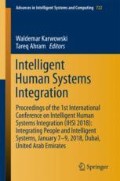Abstract
This paper presents a project, which aims to develop a low-cost Brain-Computer Interface (BCI), whose characteristics may allow educational institutions to improve the learning and evaluation methodologies applicable to a specific student. By collecting reliable electroencephalogram (EEG) data, the system will realize a cognitive state monitoring of the learner and will evaluate its brain activity to adapt the content and visualization of the learning material. Two main objectives have been established in order to determine the success of the investigation: Assess the use of contemporaneous low-cost EEG devices and applications as a proper method to obtain reliable results of the students’ cognitive state. Develop signal-processing algorithms that allow identifying the cognitive state of the students as well as their working memory load (WML).
Access this chapter
Tax calculation will be finalised at checkout
Purchases are for personal use only
References
Corbett, A.: Cognitive computer tutors: solving the two-sigma problem. In: Proceedings of the 8th International Conference on User Modeling (2001)
Graesser, A., McNamara, D.: Self-regulated learning in learning environments with pedagogical agents that interact in natural language. Educ. Psychol. 45, 234–244 (2010)
Lan, T.: Channel selection and feature projection for cognitive load estimation using ambulatory EEG. Comput. Intell. Neurosci. 2007, 12 (2007)
Pavel, M., Wang, G., Li, K.: Augmented cognition: allocation of attention. In: Proceedings of the 36th Annual Hawaii International Conference on System Sciences (2003)
AUTOPACE: Facilitating the AUTOmation PACE. http://autopace.eu/
Arnaldo, R., Comendador, F.G., Perez, L., Rodriguez, A.: Motor imagery brain–computer interface for RPAS command and control. In: 8th International Conference on Applied HF and Ergonomics (2017)
Kort, B., Reilly, R., Picard, R.W.: An affective model of interplay between emotions and learning: reengineering educational pedagogy-building a learning companion. In: Proceedings of IEEE International Conference on Advanced Learning Technologies (2001)
Lepper, M.R., Woolverton, M., Mumme, D.L., Gurtner, J.-L.: Motivational techniques of expert human tutors: lessons for the design of computer-based tutors. In: Technology in Education. Computers as Cognitive Tools (1993)
Lepper, M.R., Woolverton, M.: The wisdom of practice: lessons learned from the study of highly effective tutors. In: Improving Academic Achivements. Academic Press (2002)
Kalyuga, S., Ayres, P., Chandler, P., Swelle, J.: The expertise reversal effect. Educ. Psychol. 38, 23–31 (2003)
Paas, F., Tuovinen, J.E., Tabbers, H., Van Gerven, P.W.: Cognitive load measurement as a means to advance cognitive load theory. Educ. Psychol. 38, 63–71 (2003)
Cierniak, G.: Explaining the split attention effect: is the reduction of extraneous cognitive load accompanied by an increase in germane cognitive load? J. Comput. Hum. Behav. 25, 315–324 (2009)
Gevins, Y.: High-resolution EEG mapping of cortical activation related to working memory: effects of task difficulty, type of processing, and practice. Cereb. Cortex 7, 374–385 (1997)
Pesonen, M., Hämäläinen, H., Krause, C.M.: Brain oscillatory 4–30 Hz responses during a visual n-back memory task with varying memory load. Brain Res. 1138, 171–177 (2007)
Stipacek, A.: Sensitivity of human EEG alpha band desynchronization to different working memory components and increasing levels of memory load (2003)
NATS. http://www.nats.aero/careers/trainee-air-traffic-controllers/games/
Emotiv Insight. https://www.emotiv.com/insight/
Swartz Center for computational neuroscience. https://sccn.ucsd.edu/eeglab/index.php
Author information
Authors and Affiliations
Corresponding author
Editor information
Editors and Affiliations
Rights and permissions
Copyright information
© 2018 Springer International Publishing AG
About this paper
Cite this paper
Arnaldo, R.M. et al. (2018). Computerized Brain Interfaces for Adaptive Learning and Assessment. In: Karwowski, W., Ahram, T. (eds) Intelligent Human Systems Integration. IHSI 2018. Advances in Intelligent Systems and Computing, vol 722. Springer, Cham. https://doi.org/10.1007/978-3-319-73888-8_37
Download citation
DOI: https://doi.org/10.1007/978-3-319-73888-8_37
Published:
Publisher Name: Springer, Cham
Print ISBN: 978-3-319-73887-1
Online ISBN: 978-3-319-73888-8
eBook Packages: EngineeringEngineering (R0)

